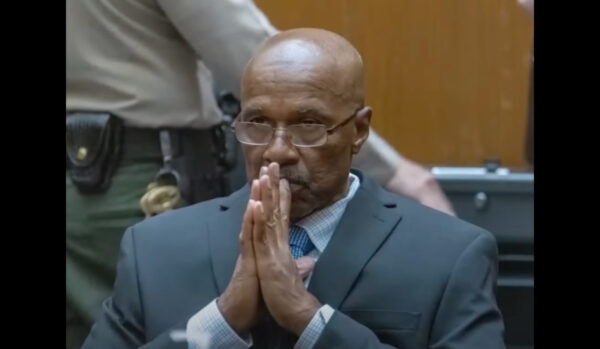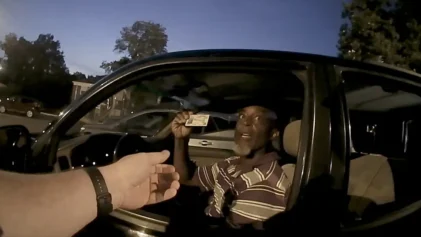A California man has been declared innocent after spending four decades behind bars for a crime new DNA evidence proved he did not commit.
Maurice Hastings, 69, can now file a claim for wrongful incarceration and receive relief for the years he lost while in prison.
The Los Angeles District Attorney worked with the Los Angeles Innocence Project and said the man had “survived a nightmare.”

Hastings who was convicted of sexually assaulting, kidnapping, and fatally shooting Roberta Wydermyer in the head in 1983, was released from prison in October 2022 after a judge vacated his conviction. DNA evidence that was never tested during the trial proved that another man violated the woman.
Despite the October ruling, he needed the courts to officially declare him innocent for him to be exonerated.
On Wednesday, Mar. 1, Superior Court Judge William C. Ryan affirmed that Hastings was “factually innocent,” NBC News reports.
Hastings could not contain his gratitude, sharing with the court after the hearing, “It means a lot. I’m grateful for the judge’s ruling and the apologies — everything has been wonderful today.”
“I’m able to let everyone know I was innocent of this crime,” he said to the LAist, “I can just move forward.”
In the state of California, a person can file a petition for a certificate of factual innocence and have the court make a finding that unequivocally declares they did not commit a crime. This is an important declaration as it sets Hastings’ legal team up to file a civil lawsuit and receive compensation for his wrongful conviction.
District Attorney George Gascón, whose office worked with Hastings’ legal team, acknowledged that after spending 38 years in prison for a crime he did not commit, he must have “survived a nightmare.”
“He spent nearly four decades in prison exhausting every avenue to prove his innocence while being repeatedly denied. But Mr. Hastings has remained steadfast and faithful that one day he would hear a judge proclaim his innocence,” Gascón said in a statement.
Authorities said Wydermyer, 30, was assaulted and abducted after going out to the market. The person who violated her shot her in the head with one single gunshot. The person then took her body and dumped it in the trunk of her vehicle and went joyriding.
According to authorities, Wydermyer’s husband Billy Ray was concerned when his wife did not return home from the store and took Pinson out to look for her.
After roaming around, they saw her vehicle being driven by someone other than the victim. The two started to chase him but were shot at by the driver. Billy Ray sustained a shrapnel wound.
The next day, Billy Ray started to get mysterious phone calls. Police tried to tap the phone, particularly when a caller asked if the husband was alive and said he should not have followed the car. Authorities then traced the call to a public telephone at Montclair Liquors in Long Beach, California.
Police arrested Hastings a few months later after a telephone bill showed that he was making phone calls on the victim’s stolen calling card. He would call women in Pittsburg from pay phones from a variety of locations, including bus stations in Los Angeles, then New Mexico, Phoenix, and Oklahoma City, the University of Michigan reports.
What made Hastings even more suspicious was that his sister lived near Montclair Liquors. (The sister would later testify at trial that another man had given her the stolen calling card numbers and she gave them to Hastings.)
The police continued to track him, catching him on Oct. 2, 1984, at his mother’s house.
In addition to being accused of her murder, Hastings was also accused of the attempted murder of Billy Ray and his friend, George Pinson, ABC 7 reports.
The initial trial for his case ended with a hung jury. Hastings was convicted after a retrial.
He was sentenced to life in prison without parole, dodging the death sentence that was on the table.
With the recent hearing, he has been cleared of the crimes associated with the husband and family friend, also.
Gascón said, “Thanks to the DNA testing completed, Mr. Hastings’ DNA profile was excluded and someone else was determined to have been the assailant in this case. In this particular case, the assailant went on to continue to harm other victims before he was arrested and prosecuted.”
The District Attorney’s Integrity Unit received a claim of innocence from Hastings and his legal team in 2021. After the DNA testing was completed in 2022, it was discovered that Kenneth Packnett was the actual murderer.
“He went on to commit other crimes after Mr. Hastings was arrested, but then he was arrested for other crimes, convicted and died in prison,” Gascón said.
Hastings says he was “overwhelmed” when he heard the news of his conviction being vacated because of the DNA results. He had always maintained his innocence, but no one believed him.
“I had tears. I asked myself, Could this be it? Could this be the end?”‘ Hastings said. “I was very emotional.”
According to a National Registry of Exonerations study released in 2022, since 1989, 3,248 people had been exonerated of crimes they were convicted of, and more than half of those exonerated have been of African descent.


